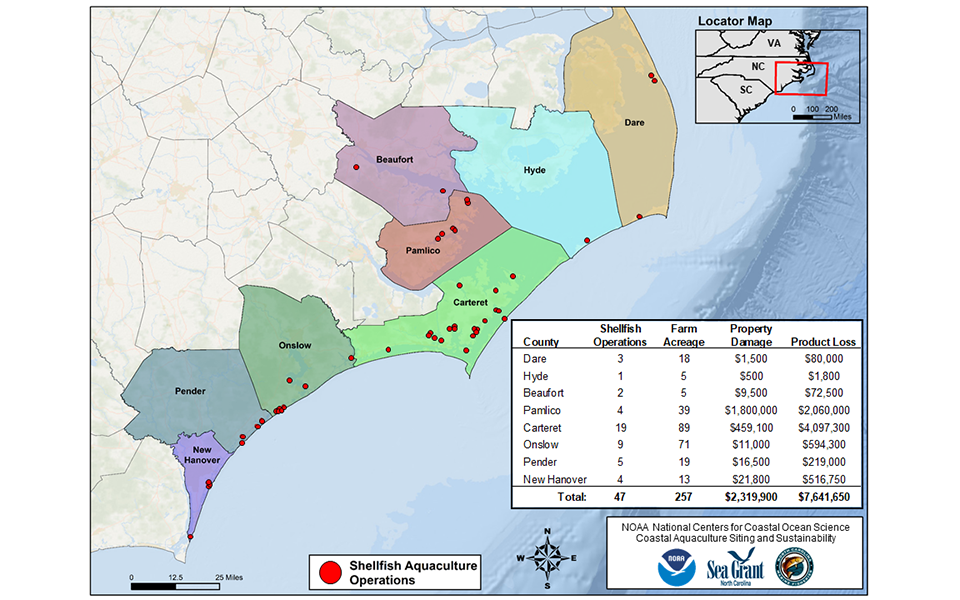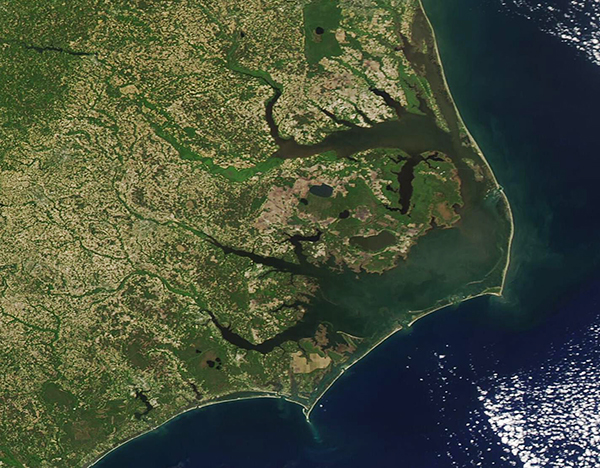NC Shellfish Aquaculture Suffers Losses of Nearly $10 Million from 2018 Storms

Above: North Carolina Sea Grant collaborated with partners from NOAA and the N.C. Division of Marine Fisheries and N.C. Department of Agriculture and Consumer Services to tally damage from hurricanes Florence and Michael in 2018.
Contact:
Chuck Weirich, 252-222-6314, chuck_weirich@ncsu.edu
Katie Mosher, 919-515-9069, kmosher@ncsu.edu
Hurricane Florence and Tropical Storm Michael brought combined damages of nearly $10 million to North Carolina’s shellfish aquaculture industry, with significant impacts to facilities, gear and crops.
The tallies as of late 2018 are from surveys conducted by North Carolina Sea Grant, with partners at the N.C. Department of Agriculture, N.C. Division of Marine Fisheries, and the National Oceanic and Atmospheric Administration. The new total updates an earlier estimate as growers continue to provide data.
Hurricane Florence brought record-setting rain not only to the coastal region but also inland, causing a flush of freshwater into estuaries — and into shellfish farms — that continued for weeks. This inflow of fresh water reduced salinity and dissolved oxygen levels, leaving poor conditions for growing oysters and clams. Powerful waves and storm surge damaged docks, waterfront buildings and gear, and also had severe impacts at shellfish hatcheries and nursery operations.
“All 47 farms that reported had significant damage, and a few farms had catastrophic losses,” notes Chuck Weirich, North Carolina Sea Grant’s marine aquaculture specialist. The tally includes some farms that had fared well through Florence, but had damage in October when Michael came through with tropical storm winds, driving waves and rain.
Weirich worked first-hand with growers to gather damage estimates using a web-based form developed by NCDA. The NOAA team then assessed the data and mapped the extent of loss in specific counties. The tally shows that storms such as Florence and Michael can bring devastating impacts to shellfish farms in coastal waters across the state.
For example, Carteret County had 19 shellfish aquaculture businesses reporting losses, the highest for any county, and also most impacts to total farm acreage at 89. Pamlico County had the highest dollar losses, with $1.8 million in property damage and $2.06 million in lost product.
Weirich will be presenting the findings at several upcoming events, including the N.C. Aquaculture Development Conference, the N.C. Oyster Summit and the regional Oysters South meeting.
Sea Grant, NCDA, and NOAA are among partners in the North Carolina Shellfish Initiative that was announced in August 2018, just weeks before Florence hit the state. The N.C. Department of Environmental Quality, N.C. Department of Commerce, N.C. Coastal Federation, and the N.C. Shellfish Growers Association are also partners in the initiative, which supports increasing shellfish stocks and their impact to coastal communities and the environment through aquaculture, restoration of wild stocks, and protecting water quality.
“Aquaculture is of particular interest,” Weirich explains,” as the state has seen an increase in water column leases that allow growers to use culture gear such as cages to produce single oysters for the coveted half-shell market.”
This helped push the farm gate value of the N.C. oyster aquaculture industry over $1 million for the first time in 2016. In 2017, that value doubled to over $2 million. The state also has a rich history of farming hard clams and Sea Grant currently is leading research to look into the potential for adding N.C. native sunray Venus clams and bay scallops as cultured species.
Editor’s Note: This post has corrected the reference of Michael as a tropical storm, not a hurricane.
##
- Categories:


